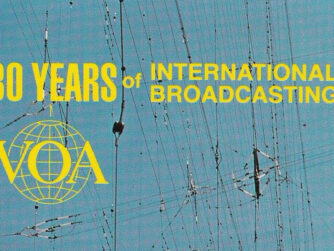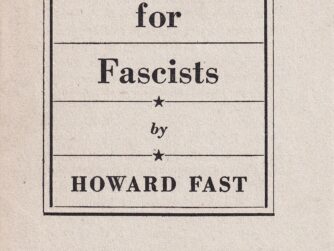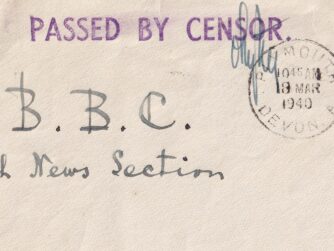Communist Spies and Agents of Influence
The official version of the Voice of America history, as summarized by Amanda Bennett, a former Voice of America director and now the head of the U.S. Agency for Global Media (USAGM), is the same as before, with no acknowledgment of any past errors or offers of apology:
Those broadcasts were lifelines to millions. Even more important, however, was the promise made right from the start: “The news may be good for us. The news may be bad,” said announcer William Harlan Hale. “But we shall tell you the truth.”1
After decades of the official presentation of the misleading history of the Voice of America’s early years and minimizing the role of its anti-communist journalists such as Alexander Barmine and many others, it is not surprising that many current and former VOA broadcasters, especially in its central English-language services, have no idea of VOA’s role as a tool of Soviet propaganda during the first years of its existence. Many are convinced that there were never any Soviet spies or agents of influence working for the Voice of America. When asked whether he knew that American novelist Howard Fast, the first Voice of America chief news writer and editor, became a Communist Party USA activist and received the Stalin Peace Prize, Sanford Ungar, former VOA Director who had served during the Clinton administration and is now the Director of the Free Speech Project at Georgetown University, said in an online panel discussion in February 2022 that this was a “McCarthyite question.” He suggested that an investigation of the critics of the Voice of America during that period would reveal that many of them were “white supremacists.”
There were some segregationist southern Democrats who criticized Voice of America broadcasts during the Cold War. Still, most of the best-informed critics of VOA programs were progressive ex-Communists; many others could be described as liberals or moderate conservatives. Ungar admitted that Fast’s communist ties were true and noted that the Soviets duped Fast, and he later broke with the Communist Party. Still, Ungar concluded that information about his support for communism might merely amuse those who hear about it. Ungar also said there was nothing to suspect there were communist agents at the Voice of America.2
As a Professor of History at Emory University, Harvey Klehr, and a Library of Congress historian, John Earl Haynes, showed in their book Venona: Decoding Soviet Espionage in America (Yale University Press, 2000), secret Soviet intelligence messages monitored by the U.S. counterintelligence services as part of the Venona project contained “the unidentified cover names of several Soviet espionage contacts in the Office of War Information,” including one in the OWI French section.3 The Office of War Information was the wartime government agency in charge of the Voice of America language services and broadcasts from 1942 to 1945. They were part of the OWI’s Overseas Operations Branch in New York City. It is true that the number of actual Soviet spies at the wartime Voice of America was small, but the number of Soviet agents of influence during and even for several years after the war was significant.
The Venona cables show that the KGB used an agent, codename “Philosopher” (OWI French section), for “providing background information and character appraisals – of OWI personnel.” The Venona project also revealed Flora Don Wovschin (codename “ZORA”), born in 1923 in the United States to Russian immigrant parents, as the most active Soviet agent in the Office of War Information, where she worked in New York as a research assistant and librarian during World War II in the Overseas Branch producing Voice of America broadcasts. In 1945, she transferred from OWI to the State Department. When, after the war, the FBI started efforts to identify her and find her, Wovschin fled in 1946 or 1947 to the Soviet Union, where she renounced her American citizenship and married a Russian engineer. The FBI received information that Wovschin later had gone to North Korea to work as a nurse and had died there.4 After the war, when the number of Soviet agents of influence at the Voice of America indeed greatly diminished, a communist spy, Zbigniew Brydak, aka Stefan Michalski, got a job at the VOA bureau in Munich in the early 1950s before going back to Poland and launching attacks on VOA and Radio Free Europe and their new anti-communist broadcasters.5 According to Marek Walicki, my deputy at the VOA Polish Service who knew Brydak, before being sent as a spy to the West, he recruited patriotic young men to become members in a fake anti-communist scouting organization, who were then arrested, tortured, and executed. However, many former and current Voice of America officials and former and current journalists are convinced that there were never any communist spies at VOA and that Communists like Howard Fast, who supported communist regimes in Eastern Europe, did not do any harm to VOA programs and audiences.
I have come to a different conclusion. Because of President Roosevelt’s wartime appeasement of Stalin, even if it were initially justified to some degree by the military necessity to defeat Hitler’s Germany at the lowest possible cost of American lives, the unconditional concessions to the Soviet dictator continued much longer than necessary. Because of the presence of the Soviet Army, Eastern Europe may have been doomed to fall under Soviet Russia’s control with or without help from the Voice of America. But VOA’s pro-Soviet propaganda made it easier for Stalin to establish communist regimes in the region. As one CIA contact told his handlers in 1953, VOA may have contributed to the death of some people with its broadcasts, which said that Stalin and the local Communists should be trusted to preserve democracy and the rule of law. One source who was presumably a well-informed Slovak told the Central Intelligence Agency that as a result of U.S. policies and VOA broadcasts shortly after World War II, “many Slovaks paid with their lives or freedom” because of the Yalta Agreement and because they did not receive accurate information from VOA about the danger of returning from the West to communist-ruled Czechoslovakia.6 The same source also said that even when the U.S. government drastically changed its policy toward Moscow and the Soviet Block a few years after the war, “this new policy has not been reflected in VOA broadcasts to Czechoslovakia.”7 Alexander Barmine ensured that the changes outlined in President Truman’s “Campaign of Truth” were quickly reflected in programming to the Soviet Union. From about 1951, VOA continued to broadcast hard-hitting reports and commentaries for several years, but they were gradually softened by USIA and State Department diplomats interested in promoting the policy of detente with the Soviet Bloc and by VOA managers who wanted to create more jobs for English programmers and force foreign language broadcasters to function mostly as translators of centrally-produced English language programs.
NOTES:
- Amanda Bennett, “Trump’s ‘worldwide network’ is a great idea. But it already exists.” The Washington Post, November 27, 2018, https://www.washingtonpost.com/opinions/trumps-worldwide-network-is-a-great-idea-but-it-already-exists/2018/11/27/79b320bc-f269-11e8-bc79-68604ed88993_story.html.
- Cold War Radio Museum, Howard Fast – Voice of America’s Stalin Peace Prize Winner, accessed April 19, 2023, https://www.youtube.com/watch?v=8NLFgmWrN3w.
- John Earl Haynes and Harvey Klehr, Venona: Decoding Soviet Espionage in America, Yale Nota Bene (New Haven: Yale Univ. Press, 2000), pp. 197-199.
- John Earl Haynes and Harvey Klehr, Venona: Decoding Soviet Espionage in America, Yale Nota Bene (New Haven: Yale Univ. Press, 2000), pp. 200-201.
- Marek Walicki, Z Polski Ludowej do Wolnej Europy (Warszawa: Bellona Spółka Akcyjna, 2018), pp. 170-182.
- The Central Intelligence Agency, Freedom of Information Electronic Reading Room, “Slovak Reaction to VOA Broadcasts,” Publication Date: June 17, 1953, https://www.cia.gov/readingroom/document/cia-rdp80-00810a001400310007-5.
- Ted Lipien, “1953 CIA Source: People Died in Czechoslovakia Because of Pro-Communist Propaganda from Voice of America,” Cold War Radio Museum (blog), January 4, 2019, http://www.coldwarradiomuseum.com/listening-to-western-broadcasts-in-communist-ruled-czechoslovakia/.








